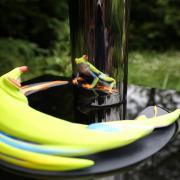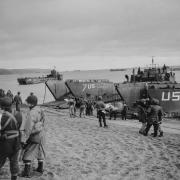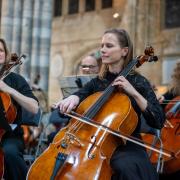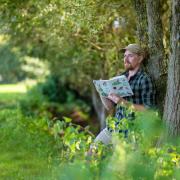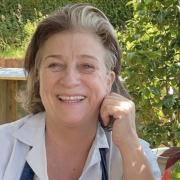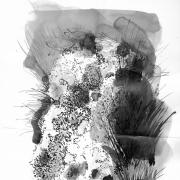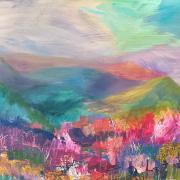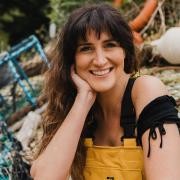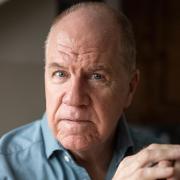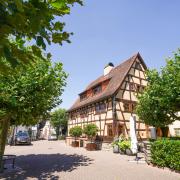North Devon artist Stephen Hunton is a lucky man., He works from a studio overlooking the River Lew in North Devon. Robert Hesketh talks techniques, materials, car boot sales and art education with this distinguished artist for Hatherleigh.
Enjoying the sunshine in Stephen Hunton's studio overlooking the River Lew, Robert Hesketh talks techniques, materials, car boot sales and art education with this distinguished North Devon artist
Since his earliest days at Burnley Art School, Stephen has experimented widely in both two and three dimensions. "I've painted an enormous variety of subjects, from landscapes to portraits, nudes to machines, depending on what interests me at the time. I take the subject as far as I can. However, I always paint in oils. I like the flexibility they give."
As a sculptor Stephen has chosen many subjects and heads of lions, elephants and boars sit proudly beside... Mick Jagger. Well, Stephen is a fan and Rolling Stone Ronnie Wood once toured Furzehill too.
Cast in weather-resistant materials, the heads begin life in clay. "The crucial creative thing is the initial modeling in clay. The follow-on processes of making the mould in silicon with a polyester jacket are essentially technical. The sculptures can then be duplicated. Having cast one I can cast more."
Over the past two years, Stephen has worked in copper. "It's such an attractive material I can see myself using it into the future. It's malleable, yet quite permanent. I usually rivet and solder, but copper also lends itself to etching. I use recycled copper from car boot sales, auctions and a metal recycling centre in Exeter.
"I've also worked in thermo polymer. When it's hot, it has a consistency like toothpaste and is worked with a small injection moulder. It's like painting in three dimensions. You can stick one piece to another and build a sculpture up. Equally, you can cut it and change it."
Stephen's a man of practical as well as artistic skills. It's probably in the genes - his father was a manufacturer, his grandfathers artisans. He began at Burnley Technical School, before taking a series of art courses.
"I'm not sure that the sort of art training I had - and I had a lot - is widely available these days. Some art schools are closing or being absorbed by universities. A lot of art now is to do with concepts: a concept is a concept in my view, it's not art. I'm interested in what you can do on the spot with what you've got, building on an awareness of sources and materials with no electronic aids or anything else intervening in the creative process.
"Burnley School of Art gave me a terrific foundation plus a grounding in art history. I went on to Dartington, which was like going to heaven. I learned a lot from the other students and I'm very grateful I was there at that time, the late '60s. We didn't have the feeling things were happening elsewhere - they were happening to us."
Stephen moved on to the Royal College of Art in London to take his master's degree. Although he went as a painter, he spent more time in the Sculpture and Industrial Design Departments. "Again, it seemed like the place to be and many talented artists were there, including Peter Blake, Carel Weight and Ruskin Spear. It was a struggle to get in because everybody wanted to go. City life didn't inspire me. I hitched to Devon regularly and brought something of the country back to London. My final show had a lot of rural influence, using materials like cow hides, tar and rope."
Stephen's next problem was making a living. He collected furniture from auctions, decorated it and took it up to London once a month to sell at Harrods and Fortnum & Mason. The profits enabled him to build Furzehill Studios, his home. He now plans to open Furzehill so that artists can work there on their own projects.
"I've got a lot of experience in several art forms and would like to pass that on, making these sessions a catalyst. We'll focus on painting, drawing and sculpture. Within that there's enormous creative scope. I envisage four-hour sessions at a cost anybody could afford. You can do a lot in four hours if you stay focused, without distractions. Being in a group with like-minded enthusiasts offers a lot of stimulation and support.
"The courses will be flexible to meet students' requirements. I'm happy to teach one-to-one or in a group. I've taught all kinds of people before, from tiny children to adolescents, college graduates and convicts - and in many places, from the Far East to Exeter prison and local schools. The most important thing is whether students are willing to lose their inhibitions and express themselves in a disciplined way.
"People will have a lot of freedom. We've got an acre of garden and no shortage of beautiful local landscapes, plus a painting studio overlooking the river and a well-equipped sculpture studio. It doesn't matter what stage people have already reached; there'll be opportunities to create some exciting work, to do things they may not have done in isolation."
MORE INFORMATION:
(updated regularly) or contact Stephen at Furzehill Studio, Gribbleford Bridge, Hatherleigh EX20 3LZ, e-mail hunton@btinternet.com, 01837 810382. Stephen welcomes enquiries about his planned courses or about commissions;



